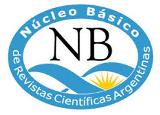Redes clientelares, agentes y dependientes en el espacio señorial castellano. Dinámica de articulación de linajes y elementos para su análisis.
DOI:
https://doi.org/10.24215/23139048e005Keywords:
linaje, bandos linajes, agentes señoriales, red de relaciones matrimoniales.Abstract
En el presente trabajo se realiza una observación del fenómeno señorial de expansión patrimonial y político de la Casa de los Velasco, desde un punto de vista “integral”, es decir, focalizando el análisis no sólo en el proceso de engrandecimiento del linaje sino también desde “abajo”, poniendo énfasis en la propia dinámica de articulación con los linajes menores asentados en los espacios locales y comarcales sujetos al poder jurisdiccional y a su presencia señorial. Se analizará la densificación señorial impuesta por la presencia de los Velasco en la ZONA ORIENTAL de Cantabria (englobando en ella la antigua MERINDAD DE VECIO y los valles de TRASMIERA) a partir del estudio de la red de relaciones matrimoniales y clientelares sostenidas con los linajes menores asentados en estos espacios.
Downloads
Downloads
Published
How to Cite
Issue
Section
License
The acceptance of an original by the journal implies the non-exclusive transfer of the economic rights of the authors in favor of the editor, who allows reuse, after editing (postprint), under a Creative Commons Attribution License -NonCommercial-ShareAlike 4.0 International (CC BY-NC-SA 4.0)
In accordance with these terms, the material can be shared (copied and redistributed in any medium or format) and adapted (remixed, transformed and created from the material another work), provided that a) the authorship and original source of its publication (magazine and URL of the work), b) is not used for commercial purposes and c) the same license terms are maintained.
The transfer of non-exclusive rights implies that after its publication (postprint) in Cuadernos de H ideas the authors can publish their work in any language, medium and format; in such cases, it is requested that it be stated that the material was originally published in this journal.
Such assignment also implies the authorization of the authors for the work to be harvested by SEDICI, the institutional repository of the National University of La Plata, and be disseminated in the databases that the editorial team considers appropriate for increase the visibility of the publication and its authors.
Likewise, the journal encourages the authors so that after their publication in Cuadernos de H ideas they deposit their productions in other institutional and thematic repositories, under the principle that offering society scientific and academic production without restrictions contributes to a greater exchange of global knowledge.










.png)

























